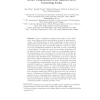Free Online Productivity Tools
i2Speak
i2Symbol
i2OCR
iTex2Img
iWeb2Print
iWeb2Shot
i2Type
iPdf2Split
iPdf2Merge
i2Bopomofo
i2Arabic
i2Style
i2Image
i2PDF
iLatex2Rtf
Sci2ools
134
click to vote
EUROCRYPT
2007
Springer
2007
Springer
Secure Computation from Random Error Correcting Codes
Abstract. Secure computation consists of protocols for secure arithmetic: secret values are added and multiplied securely by networked processors. The striking feature of secure computation is that security is maintained even in the presence of an adversary who corrupts a quorum of the processors and who exercises full, malicious control over them. One of the fundamental primitives at the heart of secure computation is secret-sharing. Typically, the required secret-sharing techniques build on Shamir’s scheme, which can be viewed as a cryptographic twist on the Reed-Solomon error correcting code. In this work we further the connections between secure computation and error correcting codes. We demonstrate that threshold secure computation in the secure channels model can be based on arbitrary codes. For a network of size n, we then show a reduction in communication for secure computation amounting to a multiplicative polylogarithmic factor (in n) compared to classical methods for small...
Cryptography | Error Correcting Codes | EUROCRYPT 2007 | Secure Computation | Threshold Secure Computation |
Related Content
| Added | 07 Jun 2010 |
| Updated | 07 Jun 2010 |
| Type | Conference |
| Year | 2007 |
| Where | EUROCRYPT |
| Authors | Hao Chen, Ronald Cramer, Shafi Goldwasser, Robbert de Haan, Vinod Vaikuntanathan |
Comments (0)

